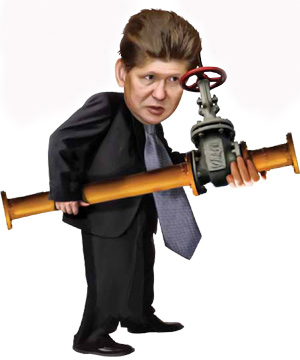 The Ukrainian Week continues its series of panel discussions with politicians and experts. The first two focused on the oligarch-controlled economy and Ukraine’s monetary security. Participants in the latest one, including representatives of big business associations, shared their opinions on transnational companies, what should be done to encourage transnational companies to bring innovations to the markets and develop manufacturing for domestic consumers and exports. Today, most transnational companies operating in Ukraine predominantly import finished goods, export raw materials, and provide financial and intermediary services. They do not create any additional value for the country. Some attempt to monopolize certain markets to earn windfall profits. Some, such as Gazprom, then exploit them for geopolitical purposes. Needless to say, this does not contribute to the development of the national economy.
The Ukrainian Week continues its series of panel discussions with politicians and experts. The first two focused on the oligarch-controlled economy and Ukraine’s monetary security. Participants in the latest one, including representatives of big business associations, shared their opinions on transnational companies, what should be done to encourage transnational companies to bring innovations to the markets and develop manufacturing for domestic consumers and exports. Today, most transnational companies operating in Ukraine predominantly import finished goods, export raw materials, and provide financial and intermediary services. They do not create any additional value for the country. Some attempt to monopolize certain markets to earn windfall profits. Some, such as Gazprom, then exploit them for geopolitical purposes. Needless to say, this does not contribute to the development of the national economy.
PROS
Yaroslav Voitko of the US Chamber of Commerce noted justly that large transnational corporations (TNCs) now generate most FDI into Ukraine, 80% of which was generated by US Chamber of Commerce members alone. The latter have also created over 1mn jobs of the total 10mn, a number that includes a large portion of public sector employees, funded by taxpayers. Volodymyr Lanovyi, President of the Centre for Market Reforms, says that the mass arrival of TNCs in Ukraine, an underdeveloped country with a cheap labour force, would have a positive impact on its economy at this point. It would enhance business culture by bringing in international standards, creating many new jobs for the 7-8mn currently unemployed Ukrainians, and relocate the manufacturing of some goods that are currently imported, to Ukraine, thus decreasing the BoP and budget deficit. Svitlana Mykhailovska from the European Business Association (EBA) claims that 11 of the top 20 tax payers in Ukraine are foreign TNCs. ArcelorMittal is the leader, although Rinat Akhmetov’s steelworks holding is No. 1 in terms of output. Mykhailovska also says that TNCs facilitate the rapid development of export-oriented software production in Ukraine. Ildar Gazizullin, Senior Economic Analyst at the International Centre for Policy Studies (ICPS), notes that TNCs invest in human resource development and for the most part, pay official wages, thus contributing to the career growth of the very best employees, unlike many Ukrainian companies, especially state-owned ones, where promotion often depends on bribes. Still, Yaroslav Voitko says that the Ukrainian government is not interested in the problems of corporate social responsibility and has no incentives or requirements for it.
READ ALSO: Investment Ultimatum
UNDISCOVERED POTENTIAL
However, TNCs in Ukraine are still not playing the positive role they could play. “The question is who needs whom more. Global corporations are already operating in Russia and Poland; there are quite a few in Georgia; but few in Ukraine,” says Sven Henniger, Board Member at the German Economic Club in Ukraine. Svitlana Mykhailovska illustrates this with the fact that less than 1% of all TNCs in the world operate in Ukraine – this is only several hundred companies, while nighbouring countries, even tiny Moldova, have thousands.
According to Ildar Gazizullin, for the most part, TNC’s activities in Ukraine are directed towards the domestic market, selling imported goods or producing (significantly less so – Ed.) goods for the Ukrainian market. Very few of them are involved in export-oriented production. Volodymyr Lanovyi explains that this is because TNCs view Ukraine as a third-world country, not exacting about quality and with low consumer demand. He also criticizes the sale of existing enterprises to TNCs because this does not create new production facilities, thus it has little effect on the country’s economic development. In his opinion, efforts should be made to encourage TNCs to establish new production facilities in Ukraine.
TNCs vs OLIGARCHS
 Experts do not agree on the potential impact of TNCs on the oligarch-controlled economy. Sven Henniger believes that TNCs will change the local business culture and environment because they have a long-term strategy, play by the rules and pay their taxes in full. According to Svitlana Mykhailovska, TNCs pose a big challenge to domestic (predominantly oligarch-owned – Ed.) business because they increase competition and promote higher standards. She mentions the lobbying of legislation to enhance fuel quality standard to Euro 4 and Euro 5 by the TNCs that are in the EBA’s fuel and energy committee as an example. However, there is great resistance from the Ukrainian companies dominating the market, which are reluctant or unable to adjust their production to meet the higher criteria. Even Svoboda’s Yuriy Levchenko who expressed the most criticism on TNCs as entities willing to maximize their profits at any cost – even if the host country suffers, admits that the transnational corporations currently operating in Ukraine are definitely better than the existing oligarch conglomerates.
Experts do not agree on the potential impact of TNCs on the oligarch-controlled economy. Sven Henniger believes that TNCs will change the local business culture and environment because they have a long-term strategy, play by the rules and pay their taxes in full. According to Svitlana Mykhailovska, TNCs pose a big challenge to domestic (predominantly oligarch-owned – Ed.) business because they increase competition and promote higher standards. She mentions the lobbying of legislation to enhance fuel quality standard to Euro 4 and Euro 5 by the TNCs that are in the EBA’s fuel and energy committee as an example. However, there is great resistance from the Ukrainian companies dominating the market, which are reluctant or unable to adjust their production to meet the higher criteria. Even Svoboda’s Yuriy Levchenko who expressed the most criticism on TNCs as entities willing to maximize their profits at any cost – even if the host country suffers, admits that the transnational corporations currently operating in Ukraine are definitely better than the existing oligarch conglomerates.
Expert opinions vary on the prospects for new TNCs to enter Ukraine under the current government and their ability to change the oligarchic nature of the local economy. According to Mykhailo Honchar, Energy Programme Director at the NOMOS think-tank, Ukrainian oligarchs will face inevitable defeat if face with competition from transnational capital. This does not mean, however, that oligarchic structures will automatically disappear once TNCs enter the market – they will adapt to the new environment in order to survive. Ildar Gazuzillin gives a telling example: ArcelorMittal has introduced relatively high corporate standards in the Ukrainian steelwork industry, but still failed to break the domination of several domestic financial and industrial groups in the sector.
READ ALSO: Dismantling the Oligarchs' Foundation
Seeing clear rival threats to their businesses, influential oligarchs make every effort to prevent or restrict TNCs from entering most sectors of Ukraine’s economy. According to Volodymyr Lanovyi, normal TNCs are not possible in a country with an oligarch-controlled economy and capitalism, because oligarchs simply do not let anyone in, hold back licenses and so on. Existing TNCs entered the market before the Yanukovych regime came to power. Yaroslav Voitko sees this as “economic nationalism” (or “Family isolationism” – Ed.) of sorts, restricting access to the Ukrainian market for both Western and Russian companies.
READ ALSO: Ukraine’s Robber Barons: Where They Come From?
 Yuriy Levchenko notes that the oligarchs will let in some TNCs, but only those that will pay kickbacks for entrance and stay away from their business. The industries where TNCs do not cause them trouble include many import-dependent markets. Still, the arrival of TNCs under the current government will contribute to the preservation of the status quo. They will adjust to the existing system and cooperate with financial and industrial groups without competing with oligarchs because they realize that they will be immediately ousted if they do. This blurs the clear line between TNCs and Ukrainian oligarch-controlled financial and industrial groups.
Yuriy Levchenko notes that the oligarchs will let in some TNCs, but only those that will pay kickbacks for entrance and stay away from their business. The industries where TNCs do not cause them trouble include many import-dependent markets. Still, the arrival of TNCs under the current government will contribute to the preservation of the status quo. They will adjust to the existing system and cooperate with financial and industrial groups without competing with oligarchs because they realize that they will be immediately ousted if they do. This blurs the clear line between TNCs and Ukrainian oligarch-controlled financial and industrial groups.
THE DANGER POSED BY TNCs
The key motivation of any TNC, just like any other business, is to gain maximum profits, says Ildar Gazizullin. If entering a country with a cheap labour force or weak environmental regulations allows them to earn more, transnational corporations will definitely take a chance. Ukrainian labour and environmental laws can be effective, but state institutions are relatively weak. In a situation like this, TNCs, as well as any other big companies, can press the government to establish conditions that will harm society. Therefore, rules should be created to force the TNC’s compliance with their social or tax liabilities before “opening the door” for them, says Yuriy Levchenko, and this requires a change of government.
European integration and the implementation of European legislation in Ukraine should play a crucial role in the process as well. Mykhailo Honchar claims that Ukraine has paid a price for its “multivector” policy as TNCs now use ambiguities in legislation to their benefit. In his opinion, implementing European legislation is a better way because many TNCs are already familiar with it, while Ildar Gazizullin suggests delegating some antimonopoly control functions to European entities.
Another important aspect is the restriction of access to the domestic market for authoritarian countries that use outdated technologies, such as China or Russia, which unlike TNCs founded by innovation-oriented managers, tend to pose a threat. Volodymyr Lanovyi points out the risks from corporations that prefer to benefit from leasing or monopolist privileges. Russian oil companies and Gazprom are an example of this in the energy sector. Gazprom is open about its intent to gain a monopoly over the gas transit system, oil companies seek control over oil refineries and retail networks to subsequently manipulate prices and terms of supply. These companies generally depress the production of goods similar to theirs in Ukraine in order to make domestic markets more dependent on them and expand the market for their own goods. In practice, Russian oil monopolies bought oil refineries in Ukraine only to shut down their operation. They strive to join gas extraction projects to hamper them. Other Russian companies, such as RUSAL, an aluminum giant, bought Zaporizhia Aluminum Plant just to remove its Ukrainian competitor from the market. Mykhailo Honchar notes that the government should be cautious with the New Seven Sisters-type companies in the energy sector. These are powerful corporations based on state capital or funded by state banks, i.e. Gazprom, Rosneft, China National Petroleum Corporation, Petrobras … Experts also say that in the future, access to the Ukrainian market should be restricted for TNCs whose key goal is to exploit natural and farming resources, a strategy that Chinese state corporations are now pursuing in Africa. Their arrival does not create new jobs or added value, does not increase GDP, improve the balance of trade or enhance competition.
READ ALSO: Government in the Service of Monopolies
EXPERT OPINION
 Sven Henniger, Board Member of the German Economic Club in Ukraine
Sven Henniger, Board Member of the German Economic Club in Ukraine
Clearly, many TNCs are interested in coming to the Ukrainian market with its 45 million potential consumers. In choosing a country to enter, TNCs are guided by potential income rather than the intent to bring good quality products and services to the local citizens. The question is, however, who needs whom: do TNCs need Ukraine or does Ukraine need TNCs? Global corporations are already operating in Russia, Poland and Georgia, but there are only a few in Ukraine. Based on my conversations with representatives of foreign, especially German and Austrian companies, I can say that all of them will be here as soon as positive changes are made to the rules on the Ukrainian market. Personally, I believe that they are necessary. They will enhance the local business culture and entrepreneurship because their entry onto the market is accompanied by long-term strategies. The fact that they play by the rules is very important. And most of them pay all taxes. The key issue now is to create relevant legislation and its subsequent enforcement.
 Ildar Gazizullin, Senior Economic Analyst at ICPS
Ildar Gazizullin, Senior Economic Analyst at ICPS
Ukraine’s economy cannot escape the influence of TNCs but the government can regulate their presence. Ukraine already has some global and regional corporations, such as KPMG, Cersanit, Сiklum and GfK, but the role of TNCs in its economy should not be exaggerated. Mostly oriented at selling imported goods or producing goods, largely for the domestic market, very few TNCs have entered the Ukrainian market to produce export-oriented goods. Neighbouring countries offer better production terms, thanks to a more favourable business environment. The flawed local business environment weakens the competitiveness of the domestic business and prevents many TNCs from locating production facilities in Ukraine. Still, their presence offers many benefits. TNCs import effective production technologies, which ensure good quality and affordable consumer goods and services produced domestically according to modern standards.
They can also have an impact on the country’s legislation. As big companies, such as Shell and Chevron, enter Ukraine’s strategic energy sector, authorities should introduce tools to protect the country’s interests. European environmental directives (environmental assessment, for instance) and energy market rules (the Third Energy Package) could serve as such tools. In the future, Kyiv could delegate some antimonopoly supervision functions to a supranational European authority.
READ ALSO: Gazprom’s Nightmare
 Mykhailo Honchar, Energy Programme Director at the NOMOS think-tank
Mykhailo Honchar, Energy Programme Director at the NOMOS think-tank
We already feel that we have paid a price for our “multivector” policy. Having failed to focus on the implementation of European legislation in a timely manner, we will now have more problems because serious TNCs will definitely use ambiguities in the law to their benefit, regardless of the industry they operate in. Business is cynical and pragmatic: maximum income is the key goal, and if this can be achieved in a transparent and compliant enough manner, without formally violating legislation, this is how it will be done. Therefore, the arrival of big companies to Ukraine should push it to the acceleration of European integration. To do so, however, the government has to become aware of its statist mission and the fact that it does not need a corrupt apparatus of officials, used to gaining wealth under the table. Other useful aspects in this context include public discussions and parliamentary hearings to establish some limits on the expansion of TNCs in Ukraine. There is no need to invent a bicycle for that. All we need is to implement European legislation because many corporations, including Shell, are already familiar with it.
Expecting many TNCs to behave like pirates is probably a mistake, because they are accustomed to operating in a certain legal framework. Stable rules of the game are what will matter. However, this concerns typical Anglo-Saxon Western-type TNCs where private capital dominates. Chinese-type companies, such as the New Seven Sisters, based on state capital or funded by state banks, are quite different and should be treated with caution.

